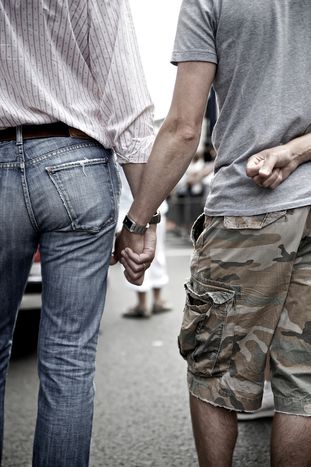
Brief guide to gay marriage laws across 'conservative' EU
Published on
Translation by:
Daniel G. RossFewer than half (44%) of Europeans are in favour of gay marriage. In April, Sweden enacted a law authorizing same-sex unions. It was only the fifth European country to take steps toward equality between heterosexual and homosexual couples. Despite appearances, when it comes to gay rights Europe is still rather conservative...
'For us, having the right to marry our same-sex partner is about equality with heterosexuals, about having the choice to marry when and if we want to. In my country, I don’t have that choice. It’s forbidden,' explains Juris Lavrikovs, a Latvian who is head of communications for the international lesbian and gay association (ILGA) of Europe. The ILGA, whose mandate is to defend lesbian, gay, bisexual, trans- and intersex rights, will publish a report on the rights of homosexuals in Europe this month. Its conclusions are damning. Of 58 countries, only 5 allow gay and lesbian couples to marry: the Netherlands was the first in 2001, followed by Belgium (2003), Spain (2005), Norway (2008) and finally Sweden in April 2009.
 The Swedish government is the first to include a clause in its legislation forbidding the refusal of religious marriage to homosexual couples. While individual pastors have the right to refuse, the lutheran church is required to find a willing pastor for each couple. In Belgium the right to marry is extended to non-citizens provided one person in the couple is a Belgian resident. These laws have frequently provoked fierce debate. In Spain the catholic church and representatives of the right-wing people’s party (PP) came out strongly against the proposed law, organising demonstrations in the streets of Madrid.
The Swedish government is the first to include a clause in its legislation forbidding the refusal of religious marriage to homosexual couples. While individual pastors have the right to refuse, the lutheran church is required to find a willing pastor for each couple. In Belgium the right to marry is extended to non-citizens provided one person in the couple is a Belgian resident. These laws have frequently provoked fierce debate. In Spain the catholic church and representatives of the right-wing people’s party (PP) came out strongly against the proposed law, organising demonstrations in the streets of Madrid.
'Civil partners'
In the rest of Europe, the situation varies from country to country. 'It is important not to follow the mainstream media and divide Europe into east and west on this issue,' notes Juris Lavrikos. 'Countries like the Czech Republic, Slovenia and Hungary are much more tolerant than Italy and Greece.' Many countries, wary of public opinion but eager to make progress on the issue, offer alternatives for homosexual couples.
 Denmark was the first country in the world to allow, on October 1st, 1989, a 'registered partnership' between homosexuals, with all of the rights of marriage except for those related to adoption and artificial insemination. In 1999 France created PACS, a contract of civil union. Someone who is PACSed shares their partner’s social security benefits as well as responsibility for their debts and for the expenses of housing in common. In Germany, since 1 August 2001, a civil contract has given gay and lesbian couples rights similar to those of marriage, excepting adoption and tax benefits. Portuguese law has recognised common-law unions of persons together for more than two years, irrespective of sex. A Croatian law on same-sex unions adopted in July of 2003 provides only the right to mutual support within the couple and the right of inheritance. Since 5 December, 2004, the United Kingdom allows homosexual couples to enter into civil partnerships with the same rights as heterosexuals. (Singer Elton John married his partner David Furnish on 21 December 2o05, the first day the unions were legally possible - ed).
Denmark was the first country in the world to allow, on October 1st, 1989, a 'registered partnership' between homosexuals, with all of the rights of marriage except for those related to adoption and artificial insemination. In 1999 France created PACS, a contract of civil union. Someone who is PACSed shares their partner’s social security benefits as well as responsibility for their debts and for the expenses of housing in common. In Germany, since 1 August 2001, a civil contract has given gay and lesbian couples rights similar to those of marriage, excepting adoption and tax benefits. Portuguese law has recognised common-law unions of persons together for more than two years, irrespective of sex. A Croatian law on same-sex unions adopted in July of 2003 provides only the right to mutual support within the couple and the right of inheritance. Since 5 December, 2004, the United Kingdom allows homosexual couples to enter into civil partnerships with the same rights as heterosexuals. (Singer Elton John married his partner David Furnish on 21 December 2o05, the first day the unions were legally possible - ed).
In 2006 the Czech parliament recognised the legal status of homosexual couples, despite an attempted veto by president Vaclav Klaus. In December 2007 the centre-left Hungarian government adopted a law on registered partnerships allowing gay and lesbian couples to legalise their status. Partnered status allows them to obtain credit and tax benefits as well as rights of inheritance.
Resistant to change
'In other countries the opposition to same-sex marriage is very strong. Work must be done to educate people,' explains Lavrikovs. In Poland, Greece, Latvia, Cyprus, Bulgaria and Romania, nearly 80% of the population is against gay marriage, according to a survey published in 2007 by the European commission. 'Moreover, the European union has no power in the area of family law,' Lavrikovs continues. The European court of human rights has ruled on several occasions that limiting marriage to heterosexual couples falls within domestic law and does not constitute discrimination. Nonetheless, some politicians defy the laws of their countries to encourage progress. Tassos Alfieries, a Greek mayor from the island of Tilos (Aegean Sea), conducted the marriages of two homosexuals couples in June 2008, taking advantage of the 1982 law on civil marriage which does not mention gender.
The world health organisation only removed 'homosexuality' from the list of mental illnesses in 1990
'But there is another problem. For example, a homosexual couple marry in Belgium, and one of the two finds a job in Poland. If they decide to move from one country to the other, their union will no longer be recognised,' explains Juris Lavrikovs. Activists fighting for equality of rights between homosexuals and heterosexuals have work ahead of them. The struggle is just beginning. On 17 May 2005 the first international day against homophobia and transphobia was celebrated in forty countries. Just fifteen years earlier, the world health organisation (WHO) finally removed homosexuality from the list of mental illnesses.
Translated from Là où les gays peuvent se marier en Europe (ou pas)



